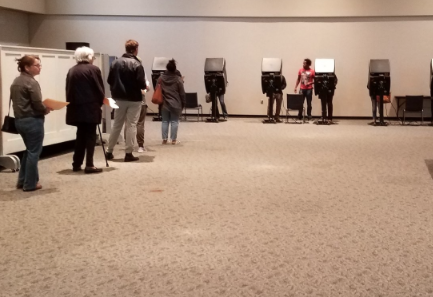 TOPEKA (AP) — Immigration and health care were the most important issues for Kansas voters casting midterm election ballots, according to a wide-ranging survey of the American electorate.
TOPEKA (AP) — Immigration and health care were the most important issues for Kansas voters casting midterm election ballots, according to a wide-ranging survey of the American electorate.
As voters cast ballots for governor and members of Congress in Tuesday’s elections, AP VoteCast found that nearly half of Kansas voters said the country is on the right track while the other half said the country is headed in the wrong direction.
Here’s a snapshot of who voted and why in Kansas, based on preliminary results from AP VoteCast, an innovative nationwide survey of about 139,000 voters and nonvoters — including 3,963 voters and 780 nonvoters in the state of Kansas — conducted for The Associated Press by NORC at the University of Chicago.
___
RACE FOR GOVERNOR
Democratic state Sen. Laura Kelly defeated Republican Kris Kobach, the outspoken secretary of state and strong ally of President Trump.
Kelly captured a sizeable lead with women and younger voters in Tuesday’s race.
Jerry Wright, a 26-year-old die-cut machine operator from Topeka, said he’s a Republican but didn’t support Kobach. He said he wanted a break from former Republican Gov. Sam Brownback’s tax-cutting.
“We need time to recover from that,” Wright said.
Voters ages 45 and older were split between the two candidates. College graduates were more likely to favor Kelly while those without a college degree were divided between Kobach and Kelly.
___
TOP ISSUES
About a quarter of Kansas voters considered health care to be the most important issue in this election while another quarter named immigration as the top issue.
Margaret Masilionis, an 84-year-old state worker and self-described “proud Democrat,” took exception to President Donald Trump’s rhetoric on immigration.
“We all came from immigrants, Masilionis said. “I don’t understand how we can exclude people and go to bed at night feeling that we’re fair Americans.”
But Keith Noe, a 79-year-old semi-retired farmer who lives outside the small town of Lecompton, said he wanted to see the border wall built, saying his views were shaped by living near the Mexican border in California in the 1990s.
“The farmers down there had to shut down their dairies down there because of illegal aliens coming through,” Noe said. “They cannot raise any crops where there’s good fields to raise them because of people tramping through. There was a constant flow even then.”
Kansas voters also named the economy, foreign policy and gun policy as top issues in this election.
___
STATE OF THE ECONOMY
Voters had a positive view of the nation’s economy — about 6 in 10 voters said the nation’s economy is good, while the remaining said it’s not good.
The state’s low unemployment rate, currently 3.3 percent, has remained exceptionally low.
The economy is on an upswing, said Angie Turnbow, a 43-year-old owner of a small Topeka business that makes uniforms and other items for sports teams.
“I probably am a little bit more conservative, and I definitely think there is something to be said for encouraging growth in small businesses, businesses in general, American business,” she said.
___
TRUMP FACTOR
Kansas voters have a mixed opinion of President Donald Trump with half saying they approve of his performance as president and the other half saying they disapprove.
Trump was a factor in the election for about half of the state’s voters, who were split on casting a ballot to support the president or oppose him.
Trump is doing a “terrible job” said James Jenkins, a 48-year-old truck driver from Topeka and a registered Democrat.
Perry Schmiedeler, a 22-year-old Washburn University of Topeka student and a registered Republican, said Trump is doing a fine job but the president didn’t sway his votes for other offices.
“It’s not as bad as everyone thought, I think,” he said of Trump.
___
STAYING AT HOME
In Kansas, a majority of registered voters who chose not to vote in the midterm election were younger than 45. A large share of those who did not vote — nearly 8 in 10 voters — did not have a college degree. Republicans accounted for 4 in 10 of nonvoters while Democrats made up about 2 in 10.
___
AP VoteCast is a survey of the American electorate in all 50 states conducted by NORC at the University of Chicago for The Associated Press and Fox News. The survey of 3,786 voters and 755 nonvoters in Kansas was conducted Oct. 29 to Nov. 6, concluding as polls close on Election Day. It combines interviews in English or Spanish with a random sample of registered voters drawn from state voter files and self-identified registered voters selected from opt-in online panels. Participants in the probability-based portion of the survey were contacted by phone and mail, and had the opportunity to take the survey by phone or online. The margin of sampling error for voters is estimated to be plus or minus 2.0 percentage points. All surveys are subject to multiple sources of error, including from sampling, question wording and order, and nonresponse. Find more details about AP VoteCast’s methodology at http://www.ap.org/votecast.
___
